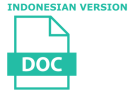Analisis Kefasihan Pembelajar Bahasa Korea dalam Membaca Teks Berbahasa Korea
Theresia Avila Rencidiptya Gitanati Firstantin(1*)
(1) Gadjah Mada University
(*) Corresponding Author
Abstract
Fluency in reading is one of the important factors in language learning, especially foreign languages. Fluency in reading can be seen from understanding vocabulary, reading speed, rhythm and expression, also understanding the reading’s contents. Reading fluently is one of the effective learning methods to help for understanding the vocabulary and the content of the text. Reading fluency is needed by Korean leaners when working with Korean stakeholders. This study analyzes the fluency of Korean language learners in reading Korean texts using qualitative descriptive methods. This study found that the learning period and the Korean Language Proficiency Test score of the learner are not always directly assesed to leaner’s fluency in reading. Fluency in reading is also influenced by some factors, such as how much intensity and frequency of learners learn new vocabulary through text, and how instructors provide learning about morphology in how to read a word in Korean.
Keywords
Full Text:
PDFReferences
Barr, R., Blachowicz, C., & Wogman-Sadow, M.(2005). Reading Diagnosis for teachers: An instructional approach. White Plains, NY: Logman.
Brown, H.D.(2001). Teaching by Principles, An Interactive Approach to Language Pedagogy. New York: Addison Wesley Longman.
Carrell, P.L.(1989). Second language reading: reading ability or language proficiency. Applied Linguistics 12(2).
Eskey. David E(1975). Advance Reading: The Structural Problem (In the Art of Tesole)
Gardner, D. (2004). Vocabulary input through extensive reading: A comparison of words found in children’s narrative and expository reading materials. Applied Linguistics, 25(1).
Jensen, L.(1986). Advanced reading skills in a comprehensive course. In F. Dubin, D. E. Eskey, & W. Grabe (Eds.). Teaching second language reading for academic purposes. MA: Addison Wesley.
Khun, R. Melanie & Levy, Lorell.(2015). Developing Fluent Readers: Teaching Fluency As a Foundational Skill. New York: The Guilford Press.
LaBerge, D., & Samuels, S. (1974). Toward a theory of automatic information processing in reading. Cognitive Psychology, 6, 293-323.
Heibert, E. H., & Fisher, C. W. (2002). The critical word factor in the text for beginning readers: Effects on reading speed, accuracy, and comprehension. Paper presented at the annual meeting of American Educational Research Association, April 4, 2002.
Pikulski, J. J., & Chard, D. J. (2005). Fluency: Bridge between decoding and reading comprehension. The Reading Teacher, 58, 510-519.
Walker, B. J., Mokthari, K., & Sargent, S. (2006). Reading fluency more that fast and accurate reading. In Rasinski, T. V., & Blachowics, C.(Eds), Fluency Instruction research-based best practices (pp.86-105), New York: The Guilford Press.
강현화.김민옥.김제열.우인혜.이숙(2009). 「한국어이해교육론」, 형설출판사.
김다혜(2007). 「학문 목적 한국어 학습자의 읽기 능력 향상을 위한 마인드맵 활용 연구」, 이화여대 교육대학원 석사.
김소현(2002). 「과업유형에 따른 영어 읽기 능력 향상 효과에 대한 연구」, 이화여대 대학원 석사 학위 논문.
김현연(2005). 「텍스트 구조 지도가 읽기에 미치는 영향 연구」, 『국어교육연구』 37.
김애화,박성희,김주현(2010). 「초등학생의 읽기 유창성 특성 연구: 읽기 유창성 발달 패턴 및 오류 유형 분석」, 한국어청각임상학회.
노순관(1985).「읽기 학습기능의 지도 방안」,『교육연구』190, 한국교육생산성연구소.
손경숙(2000). 「한국어 학습자의 읽기 전략 훈련과 학습 결과 분석 연구」, 연세대학교 교육대학원 석사학위 논문.
하원영(2012). 「초등학생의 영어 읽기 유창성 발달에서 반복 읽기와 확대 읽기의 효과 비교」, 한국외국어대학교 석사학위 논문.
Article Metrics
Refbacks
- There are currently no refbacks.
Copyright (c) 2019 The Author(s)

This work is licensed under a Creative Commons Attribution-ShareAlike 4.0 International License.







